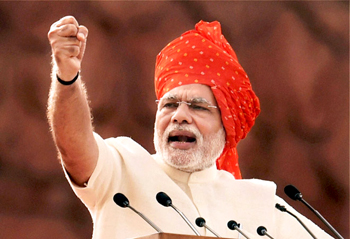New Delhi, Mar 21: Reservation for the Scheduled Caste, Scheduled Tribes and the marginalised in the country will remain untouched, Prime Minister Narendra Modi said when he delivered the Ambedkar Memorial Lecture after he laid the foundation stone for a state-of-the-art memorial for the Dalits' rights crusader in New Delhi.

Highlights
Babasaheb was the voice of the marginalised. He is a Vishwa Manav. Only talking about him with respect to India is injustice to him: PM
The way Sardar Patel worked for Political unification, Baba Saheb Ambedkar worked for social unification: PM Modi
Few people know about the reason why Dr. Ambedkar had to resign from ministry? This part of history is either forgotten or diluted: PM
When issue of equal rights to women came up, Babasaheb was clear that if women don't get equal rights I cant be a part of the ministry: PM
Baba Saheb Ambedkar was as iconic as Martin Luther King who fought for the oppressed: PM Modi
Baba Saheb was messiah of all labourers, he was the architect of foundation labour laws: PM Modi
There is a bill oB waterways in Parliament but let me tell you this vision is of Dr. Ambedkar. He believed in India's maritime strength: PM
Baba Saheb Ambedkar was as iconic as Martin Luther King who fought for the oppressed: PM Modi
Baba Saheb was messiah of all labourers; he was the architect of foundation labour laws: PM Modi
When Vajpayee ji became PM, sections started saying reservation will go. He was PM for two terms nothing of that sort happened. Nothing has ever happened to the reservation for Dalits, tribals, where we are in power but still this lies is spread to mislead. This is a right that nobody can snatch: PM speaks on reservations for SC, ST and marginalised communities: Modi
I have got an opportunity to fulfil Baba Saheb's dream. He left us in 1956. Today, after 60 years, a memorial is being set up: PM Modi
60 years have passed! I don't know how we can explain this, but we have had to wait for 60 years for this: PM Modi





Comments
Ummah gang chummah kodta irodu nodree . ..next time modi na defeat madtavanthe byaari galu ..haha. ..good joke ...entire 150 crore slummist sorry islamist ...united against our beloved Israel ...shyaata nu keelalikke agilla saabigalige hahaha .....innu Shri Shri sarva shakthimmaan modi na beelsakke Agatha...no ways ...anyways mouka mouka mouka ...this song I will sing here in 2019, when modiji will win next time ...jigadist infrustrure is trumbling due to tougher modi action in real estate and action of NIa ..so their dream of making India darool uloom is under threat ...so they are finding all silly reason to target sangh parivar by using kallayya kumar ...and khaali dose along with gandu ...haha...hara hara modi ...parapara jihadi ...
Nobody can take away the rights of SC ST, But we will take away your right to be a PM in next election.
Would your Bachelor Club @ Nagpur allow you to fulfill a fraction of what you said at Sufi Conference and Ambedkar Memorial. Next Month election (1+4 states) preparation speech???
THEN WHY CHANT ALL ARE EQUAL.
ALL ARE NOT EQUAL. INFLUENCE AND PARTIALITY IS STILL THERE.
Feku must have copies some contents from Kanhaiya Kumar's speech. Mr. Prime minister, even if you say, it's not the right, We know that, it's their right and we will not allow you to take it away
Add new comment